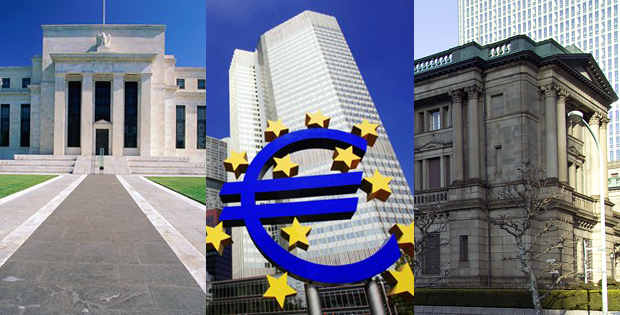by Franklin Templeton Investments
Global equity markets were broadly higher last week, with stocks in mainland China outperforming, thanks to hopes of fresh stimulus from the Chinese authorities. European stock markets generally had a positive week, despite a number of headwinds. Spain was the only major European market to end the week in the red. US equity markets also had a good week, thanks to a bounce from technology stocks.
The Digest
Trade Concerns Linger
 Looking at the bigger picture, the only real change in the ongoing global trade tensions last week was the apparent resolution of US President Trump administration’s brief spat with Mexico.
Looking at the bigger picture, the only real change in the ongoing global trade tensions last week was the apparent resolution of US President Trump administration’s brief spat with Mexico.
Equity markets rallied on Monday after the United States delayed its threatened tariffs on Mexico for 45 days. Trump then tweeted on Friday that the United States had reached a deal that would stop the 5% tariffs being implemented at all. This was a short-term market concern and may rear its head again, but for now the market seems to have moved on.
Mexico’s conciliatory tone to Trump’s aggressive approach seems to have helped diffuse the tension. Its response to the Trump administration differs markedly from that of China. The Chinese authorities said last week they would “fight to the end” when it comes to the trade war.
On Tuesday of last week, Chinese equities rallied after the country’s government announced it would allow the proceeds of so-called “special bonds” to be used as capital within infrastructure products.
Trump has been pushing for China to move its focus to the services sector, rather than industrial production, and so this sent a message of defiance to the United States.
Some asset buying from the Peoples Bank of China (PBOC) also likely helped the Chinese equity rally Tuesday. Hong Kong-listed equities also made gains, with the rhetoric from the PBOC helping to calm markets despite a flare up of mass protests over plans to allow extraditions from the special administrative region to mainland China.
On the geopolitical front, we are now looking towards the G20 meeting at the end of the month. US Treasury Secretary Steven Mnuchin has suggested significant progress could occur at a meeting there, although President Xi Jinping has not yet confirmed that he will meet Trump at the event. Trump has threatened to impose tariffs of 25% or “much higher than 25%” on US$300 billion of Chinese goods if President Xi declines to meet him.
Despite Mnuchin’s comments, over the weekend US Commerce Secretary Wilbur Ross tempered expectations for a resolution at the summit in Japan. Ross said: “I think the most that will come out of the G20 might be an agreement to actively resume talks.”
Central Banks: Dovish All Around?
 Despite the increased tensions, US equities were higher last week, with weaker macro data increasing the chances of a dovish tone from the US Federal Reserve (Fed) at its meeting this Wednesday.
Despite the increased tensions, US equities were higher last week, with weaker macro data increasing the chances of a dovish tone from the US Federal Reserve (Fed) at its meeting this Wednesday.
An interest-rate cut this time is not priced in, but the probability of cut from the Fed by the end of 2019 is now at 99%, according to Fed funds futures.
Australian equities hit an 11-year peak on Friday in a similar “bad news is good news situation”. Continued weakness in the Australian labour market boosted expectations of further policy adjustments from the Reserve Bank of Australia (RBA). The RBA had implemented an interest-rate cut the previous week.
Ahead of the Bank of Japan’s monetary policy meeting on Thursday of this week, we heard from governor Haruhiko Kuroda last week. He suggested that the central bank could be prepared to offer more stimulus as it pursues its 2% inflation target. This provided a boost to Japanese equities.
The Bank of England’s monetary policy committee also meets this week. While no policy change is expected, UK macro data has been deteriorating and it will be interesting to see if the central bank’s commentary takes a more dovish slant.
The meeting of European Central Bank (ECB) officials in Sintra, Portugal, this week, takes on additional significance as the European economy remains mired in disinflation, and growth remains elusive. Instead of hiking rates in September as ECB President Mario Draghi had hoped at the beginning of the year, policymakers are likely to be talking about the timing of rate cuts again as well as additional liquidity support.
Crude Oil Price Volatility
 Oil prices were choppy last week as a mix of continued US inventory builds and an escalation in geopolitical risks took their toll.
Oil prices were choppy last week as a mix of continued US inventory builds and an escalation in geopolitical risks took their toll.
Non-OPEC (Organization of the Petroleum Exporting Countries) supply growth and concerns around a potential global economic slowdown have weighed on the commodity in recent months.
Global demand growth appears to be continuing to slow, especially with trade tensions dragging back the Chinese economy, prompting the International Energy Agency (IEA) to cut its 2019 demand forecast. Chinese industrial production growth fell to its lowest level since 2002 in May, down 5% year-on-year.
Geopolitical risks rose in the Middle East on Thursday with news that two oil tankers appeared to have been attacked in the Gulf of Oman. The United States government blamed forces linked to the Iranian government for the attacks.
About one-third of all seaborne crude oil passes through the Straits of Hormuz (which connects the Persian Gulf and the Gulf of Oman); therefore, the strategic significance of these attacks is clear.
Any disruption in this sea passage can greatly impact oil supply from the region. Brent crude oil prices surged early Thursday just before the European equity market opened that day. This wasn’t enough to outweigh demand concerns, however, and the price of West Texas Intermediate (WTI) crude oil still ended the week lower.
Last Week
Europe
European equities finished last week higher overall, despite a number of geopolitical issues weighing on global markets.
Italian equities outperformed the other major indexes in the region after the country’s Finance Minister Giovanni Tria said he was confident Italy could avoid disciplinary action from the European Commission for its weighty budget deficit.
Greece was also an outperformer, as headlines build around a general election in the country. Spanish equities lagged the major indexes, led by the banks.
In terms of sectors, basic resources were the obvious outperformer in Europe last week amid strength in iron ore prices, which were up over 10% on the week as stimulus hopes from China offered support. Technology was the underperformer, with energy stocks closely following on the move in crude oil prices.
In the United Kingdom, the Conservative Party’s leadership race to find Theresa May’s successor as prime minister dominated headlines. Last week saw the first round of voting among Conservative members of parliament. Brexiteer Boris Johnson came out on top with 114 votes (more than expected). A number of candidates didn’t meet the threshold of votes (16) needed to continue in the process. Moves in sterling have been fairly muted as we seem to be in “wait-and-see” mode. The second round of voting is on Tuesday, June 18, and the threshold to proceed to the next round is 32 votes.
Americas
US equities showed some moderate strength last week, notwithstanding a rise in geopolitical tension between the United States and Iran as well as the seemingly omnipresent trade war with China.
Consumer discretionary stocks outperformed on the week, while energy stocks lagged. US oil inventory builds and increasingly bearish demand forecasts certainly didn’t help the energy sector.
US macro data was relatively soft last week. Core producer price index (PPI) data published on Tuesday was in-line with expectations. However, consumer price index (CPI) data the following day came in behind expectations. The disappointing print raised expectations for a US interest-rate cut in September. Retail sales also disappointed on Friday, coming in slightly below expectations.
The Federal Open Market Committee’s (FOMC) June meeting takes place this Wednesday. While we expect no change to interest rates, the market will be focused on any clues which may confirm the market expectation of a rate cut ahead.
Asia
Asian equities generally produced a positive performance last week as investors shrugged off fears around the US/China trade dispute and on hopes of Chinese stimulus.
Hong Kong-listed equities saw more muted gains than their Shanghai-listed peers, as the political turmoil in Hong Kong weighed on investor sentiment. Widespread protests against proposed extradition laws have dominated the headlines.
Over the weekend, the Hong Kong government did suspend the law, after an estimated two million people took to the streets to protest.
As discussed, Japanese equities were helped by dovish comments from BOJ Governor Kuroda.
Meanwhile, Australian equities made multi-year highs last week following the rate cut from the RBA the previous week.
Week Ahead
Politics
- Events in Hong Kong are front and centre for Asian markets, as the embattled legislature face unprecedented protests against proposed extradition laws.
- Noise around the US/China trade spat will most likely increase ahead of the G20 meeting on June 28.
- Tensions in the Middle East will likely be a driver of energy prices.
- In the UK, the Conservative Party’s search for a new leader (and UK prime minister) continues as the leadership race is whittled down to two.
Central banks
- A notable week ahead for central bank action. Wednesday’s Fed meeting will be centre stage this week but the Bank of England and Bank of Japan also have monetary policy meetings scheduled for Thursday.
- ECB President Mario Draghi speaks at the annual ECB Forum on Central Banking 2019 in Portugal.
Macro Data
- Tuesday: Germany Business Confidence survey results, US Housing Starts
- Wednesday: UK CPI, UK Core CPI
- Thursday: UK Retail Sales, US Philadelphia Federal Reserve Business Outlook,
- Friday: Germany/France/Eurozone/US purchasing manager index (PMI) data, US Existing Home Sales
Views You Can Use
Insight from Our Investment Professionals
Trade War Concerns Rattle Emerging Markets in May
Trade tensions caused investors to back away from emerging markets in May, but there are many reasons to be optimistic about the asset class and the earnings outlook ahead, according to Franklin Templeton’s Emerging Markets Equity team. The team outlines recent news and events influencing the market and where pockets of potential opportunity might be found. Read More.
The “Halo Effect” of Saudi Arabia’s Emerging Markets Arrival
Saudi Arabia’s inclusion in the MSCI Emerging Market Index marks a significant milestone for the MENA region, according to Salah Shamma, Franklin Templeton Emerging Markets Equity’s Head of Investment, MENA. He explains the “halo effect” from this move that mirrors that of other prominent index providers, and shares why the region is becoming much harder for global investors to ignore. Read More.
Unlocking Innovation: Strategies from Silicon Valley CEOs (Podcast)
Most companies want to be innovators in their field, but how does a company foster innovation? In our latest “Talking Markets” podcast, a panel of accomplished Silicon Valley CEOs—including Franklin Templeton’s Greg Johnson—discuss how to drive and nurture a culture of innovation within their employees. Read More.
Should Markets Heed Recession Warnings?
Amid a renewed US-China trade spat and additional tariff tensions between the United States and Mexico, investor concerns about a possible recession have heightened, according to Ed Perks, executive vice president and chief investment officer, Franklin Templeton Multi-Asset Solutions. He discusses how markets are reacting to the possibility of a US recession and explains why he favours a defensive stance for the multi-asset space during this period. Read More.
For timely investing tidbits, follow us on Twitter @FTI_Global and on LinkedIn.
Important Legal Information
This article reflects the analysis and opinions of Franklin Templeton’s European Trading Desk as of June 17, 2019, and may vary from the analysis and opinions of other investment teams, platforms, portfolio managers or strategies at Franklin Templeton. Because market and economic conditions are often subject to rapid change, the analysis and opinions provided may change without notice. An assessment of a particular country, market, region, security, investment or strategy is not intended as an investment recommendation, nor does it constitute investment advice. Statements of fact are from sources considered reliable, but no representation or warranty is made as to their completeness or accuracy. This article does not provide a complete analysis of every material fact regarding any country, region, market, industry or security.
Nothing in this document may be relied upon as investment advice or an investment recommendation.
Data from third-party sources may have been used in the preparation of this material and Franklin Templeton (“FT”) has not independently verified, validated or audited such data. FT accepts no liability whatsoever for any loss arising from use of this information and reliance upon the comments, opinions and analyses in the material is at the sole discretion of the user. Products, services and information may not be available in all jurisdictions and are offered by FT affiliates and/or their distributors as local laws and regulations permit. Please consult your own professional adviser for further information on availability of products and services in your jurisdiction.
What Are the Risks?
All investments involve risk, including possible loss of principal. The value of investments can go down as well as up, and investors may not get back the full amount invested. Stock prices fluctuate, sometimes rapidly and dramatically, due to factors affecting individual companies, particular industries or sectors, or general market conditions. Bond prices generally move in the opposite direction of interest rates. Thus, as prices of bonds in an investment portfolio adjust to a rise in interest rates, the value of the portfolio may decline. Investments in foreign securities involve special risks including currency fluctuations, economic instability and political developments. Investments in developing markets involve heightened risks related to the same factors, in addition to those associated with their relatively small size and lesser liquidity.
Past performance is not an indicator or guarantee of future performance.
Links to External Sites
Franklin Templeton Investments is not responsible for the content of external websites.
The inclusion of a link to an external website should not be understood to be an endorsement of that website or the site’s owners (or their products/services).
Links can take you to third-party sites/media with information and services not reviewed or endorsed by us. We urge you to review the privacy, security, terms of use, and other policies of each site you visit as we have no control over, and assume no responsibility or liability for them.
Copyright © Franklin Templeton Investments











